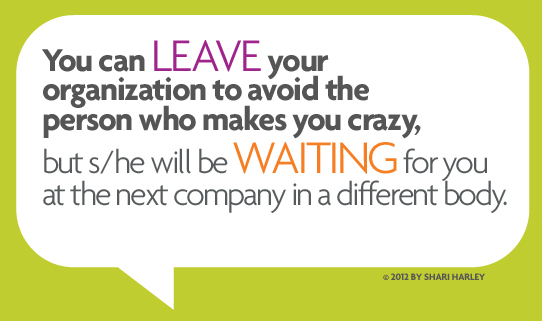Dealing With Difficult Coworkers: Three People No One Can Work With
If you read your organization’s handbook carefully you will see, in the very fine print, the rule stating that there will be three people in your organization who no one can work with. Everyone knows who these people are. They are the people who employees are afraid of, who tend to make others’ lives hard, and who no one wants to work for.
Employees wonder, doesn’t anyone in management know about these people? Why isn’t anyone DOING anything? Someone is most likely doing something. Dealing with difficult coworkers just take time to work themselves out. And managers can’t talk about others’ performance with you, as you wouldn’t want them talking about your performance with others.
What to do in the face of a crazymaker who doesn’t appear to be going anywhere?
Crazymakers are often bullies and bullies push the people around who let them do so. Despite your fear, give it right back to a bully. Chances are she will back off and find someone else to pick on. Do this professionally. Don’t compromise your own reputation by interacting with a bully in the way she interacts with you.
Work around the person. I’m not giving you a pass to avoid the people you don’t like working with. If you have done everything you can to work well with someone and he won’t work with you, do your minimal best. Be polite and respectful. Keep the person in the loop when necessary. But don’t go out of your way to nurture the relationship. You can’t work with someone who won’t work with you.
Doing everything to work well with someone includes talking to the person about your working relationship, admitting it’s strained, and asking for feedback about what would improve the relationship. Doing everything might involve getting a third party or outside mediator to broker a conversation. It might include weekly meetings to ensure regular communication. If you’ve tried ALL of these things with no outcome, then you can work around the person. But everything is NOT, “I sent three emails and didn’t hear back.”

You can leave your organization to avoid the person who makes you crazy, but s/he will be waiting for you at the next company in a different body.
If you like the work you’re doing and, for the most part, like where you work, don’t let dealing with difficult coworkers drive you from the organization. Ask for help. Let someone who can do something about the situation, assist you or at least give you the go ahead to work around that person, when possible. And if the situation becomes untenable, before you resign, tell someone in a position of formal authority that you’re at the end of your rope and you’re planning to leave. If something is going to change in the short term, he or she will often know and tell you.


